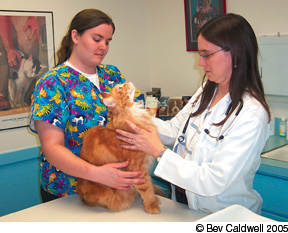A perfectly well-qualified private-practice veterinarian may sometimes, despite considerable expertise, be unable to diagnose or treat a feline ailment, says Dr. James Richards, DVM, director of the Cornell Feline Health Center. For example, he says, A thorough diagnosis may require a CT scan, and certainly only the very largest private practices have CT scanners. Or a cat with hyperthyroidism may require treatment with radioactive iodine, and thats something that the vast majority of practices wont be able to provide.

288
In such a case, he points out, the cat owners alternative is to seek proper care at a facility that is so equipped – either a sophisticated university-based teaching hospital, a private referral hospital or the offices of a board-certified veterinary specialist.
Veterinary Teaching Hospitals
About two dozen U.S. veterinary colleges are currently accredited by the American Veterinary Medical Association (AVMA). Among these institutions, Cornell Universitys number-one ranked college of veterinary medicine has one of the newest, largest and most highly-respected hospitals.
At the Cornell University Hospital for Animals (CUHA), patients with complicated medical and surgical problems – referred by their primary-care veterinarians – are treated by faculty specialists.
Specialties include anesthesiology, behavioral medicine, cardiology, dentistry, dermatology, oncology, orthopedics, ophthalmology, avian and exotic-animal medicine and more. In addition, about 17,000 cats, dogs and other small mammals – and birds and reptiles, too – receive medical care each year at CUHAs Companion Animal Hospital, where veterinary students – supervised by faculty veterinarians – participate in each case as appropriate.
If you and your private practice veterinarian agree that your cat needs the care of a medical specialist, an appointment at a veterinary teaching hospital is a reliable option. Contact information for accredited institutions may be obtained from the AVMA on the Internet at http://avma.org/.
Board-Certified Specialists
According to Dr. Richards, veterinary colleges are not the only option for specialized feline healthcare, however. Years ago, he says, that was the case. But today, there are referral hospitals or board-certified specialists in private practice in most communities. For the most part, they exist solely to see cases referred to them by primary care veterinarians in their area.
How do you find a board-certified veterinary specialist in your area? The first option is to ask your primary care veterinarian for a referral. Otherwise, you can find listings of specialists nationwide by searching the Internet by specialty. Check, for example, for American College of Veterinary Dermatology, American College of Veterinary Radiology and so forth.
Cost Factors
The fees for treatment at a veterinary college, says Dr. Richards, will tend to be significantly greater than those charged by the typical primary care veterinarian. On the other hand, he notes, the cost of treatment at CUHA and other veterinary teaching hospitals is likely to be very competitive compared to the fees associated with treatment by a specialist in private practice.



